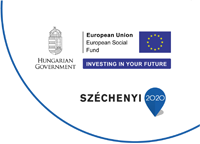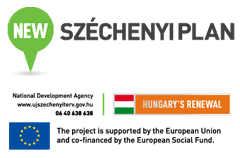Foundation for Information Society (INFOTA) has been operating as a research institute and knowledge centre since 1998. Its activity covers R&D, innovation, application development and consultancy tasks for industrial, commercial and service sector, state organisations and municipalities in Hungary and abroad.
Its interest area has got a wide range: information society, social networks and multicultural issues, information management, knowledge management, eLearning, educational games, simulation and optimisation of value production business processes, ebusiness and e-services, data and text mining, economy modelling, trend analysis, decision support, digitisation and information retrieval, data protection and information freedom, IT safety and security, tourism and heritage protection etc.
Related to the above, it makes software development and implements mobile and cloud based systems.
The R+D+I projects are made partly on the basis of orders by companies and institutions, partly in the frameworks of Hungarian or EU project calls, in order to further develop achievements as well as to create new products.
INFOTA is a registered adult training institution.
Current courses
Introduction
Latest publications
Priority project
 TÁMOP-2.2.4-11/1 – Joint knowledge for the success of entrepreneurships along the border
TÁMOP-2.2.4-11/1 – Joint knowledge for the success of entrepreneurships along the border
In the framework of the call TÁMOP 2.2.4-11/1, the Foundation for Information Society received a 30.77 million HUF support from the European Union for the project entitled Joint knowledge for the success of entrepreneurships along the border. The support was received for the implementation.
Contact
- Mail: 1507 Budapest, PO Box 213.
- Phone: +36-1-279-1510
- E-mail: info@infota.org








AI Course Starts
In cooperation with Neumann János Nonprofit Public Benefit Ltd. and Neuron Solutions Ltd., we have created a practical training course for employees working in SMEs that introduces the basics of using artificial intelligence in the workplace. Registration for the first courses is now open!
(Courses run in Hungarian).
https://neum.hu/palyazati-adatlap/
Our foundation supports the 55th András Román Summer Course on Monument Protection
Infota supports the organization of the 55th András Román Summer Course on Monument Protection in Budapest, between 6-10 July, 2025.
Christmas and New Year wishes
Stepping Up from Drifting – just published
Our volume summarizing the results of one of the important research projects of recent years has now been published in print, edited by Akadémiai Kiadó.
Edited by: György Boda
Akadémiai Kiadó, November 2024
ISBN: 978 963 664 051 4
Amid the pressure of the changing world economic order and the increasingly strong domestic socio-economic problems, analyses that unbiasedly and comprehensively reveal how we have exploited our opportunities so far and how we can choose a more productive path are of exceptional value.
The work of György Boda and his co-authors deserves special attention from three very important aspects, and the simultaneous validation of these aspects makes the book one of the most valuable situation-assessment readings of recent years. It acknowledges the results achieved since the change of regime, but points out why these have fallen short of expectations and possibilities. The focus of its analysis is on the real economy, the corporate sphere, but through this the effects and problems of social governance and regulation also come through. It shows what the main reasons are for the competitiveness deficiencies of companies, and how these necessarily lead to the failure of the expected macroeconomic and social convergence.
Another merit of the book is that it supports its message with very extensive statistical material, data, and calculations. It uses well-chosen databases, and handles these with demanding and mostly easy-to-follow calculation methods. It should be emphasized that while the authors use many controversial concepts in the book, they create clear situations by clearly providing their own interpretation and, where necessary, their thinking related to measurement.
A third important feature of the research is its historical and social embeddedness. It does not stop at exploring the direct causes of the phenomena, but points out the influential, often determining role of the ancient and recent past, and their interpretation. It uses statistical analysis and historical experience together to outline the possibilities for moving up from the current situation. As a conclusion, it defines the establishment of a political mechanism supporting the development and increasing the role of human capital as a fundamental condition for this move up.
Attila Chikán
Best Exhibitor Award on Chinese – Hungarian AI Innivation Summit, 2024
Over 40 AI-focused tech exhibitors gathered at the AI Transformation Conference & Innovation Summit 2024, alongside leading Chinese and Hungarian companies, research groups, technology leaders, innovators, startup incubators, and investors from Hungary and Shenzhen. Together, they will explore collaborations and forge partnerships, driving groundbreaking projects and future business opportunities.
Our research proposal ’AI based somato mapping’ presented by Ferenc Kiss and Sándor Vincze won Best Exhibitor Award.
https://scitope.com/ait24/